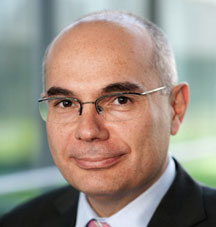PETER A. JONES, PH.D., D.SC.
Director of the USC Norris Comprehensive Cancer Center
Distinguished Professor of Urology, Biochemistry, Molecular Biology
Keck School of Medicine, University of Southern California
Peter A. Jones, Ph.D., D.Sc., Director of the USC Norris Comprehensive Cancer Center, is a Distinguished Professor of Urology and Biochemistry & Molecular Biology at the Keck School of Medicine of the University of Southern California, and the H. Leslie Hoffman and Elaine S. Hoffman Chair in Cancer Research. He is known for his studies on the molecular biology of cancer and of basic mechanisms of DNA methylation and its role in cancer and differentiation. In 1980, Dr. Jones made a seminal discovery that the drug 5-azacytidine could induce profound changes in gene expression at the same time as being a powerful inhibitor of DNA methylation. This discovery was the first to causally link DNA cytosine methylation, differentiation, and gene expression and played a large part in opening the now burgeoning field of epigenetics. The discovery of the mechanism of action of this drug led directly to the isolation of the first mammalian determination gene and also to the discovery of a large number of tumor suppressor genes which become epigenetically silenced in human cancer. The drug has now been approved for use in the treatment of myelodysplastic syndrome by the FDA. In addition to this work, Dr. Jones’ laboratory has played a seminal role in the delineation of molecular pathways leading to human bladder cancer, to the realization that DNA methylation sites are hotspots for cancer causing mutations and to the growing realization that epigenetic silencing plays a major role in human carcinogenesis. Dr. Jones’ work has been recognized as a “milestone” in gene expression and a “milestone” in cancer by Nature magazine. He was recently selected to co-lead one of the five prestigious “Dream Teams” selected by Stand Up 2 Cancer, an initiative dedicated to funding cutting-edge research designed to bring new cancer treatment to patients in an accelerated timeframe. Dr. Jones was born in South Africa, raised and attended school in Rhodesia (now Zimbabwe), and received his Doctor of Philosophy Degree from the University of London in 1973. He joined the University of Southern California in 1977, attaining the rank of Professor in 1985, and becoming Director of the USC Norris Comprehensive Cancer Center in 1993. In 1999, he was named Distinguished Professor of Urology and Biochemistry and Molecular Biology at USC. He has received a variety of honors, including a MERIT Award from the National Cancer Institute, the AACR Kirk A. Landon Prize for Basic Cancer Research in 2009 and the David Workman Memorial Award from the Samuel Waxman Cancer Research Foundation in 2008. He was named a Fellow of the American Association for the Advancement of Science in 2010. He is the past President of the American Association for Cancer Research. He is the author of more than 250 journal publications and book chapters, and he serves on several national and international committees, panels, and editorial boards.






